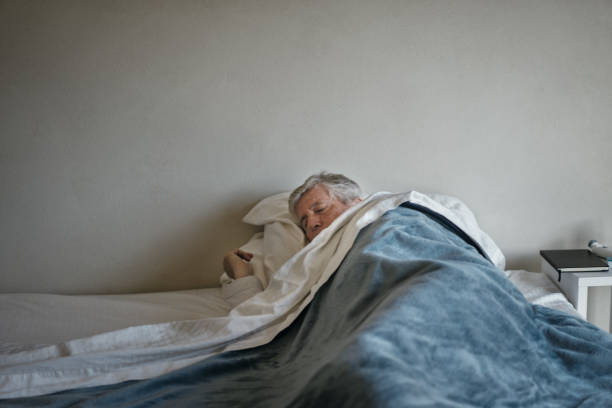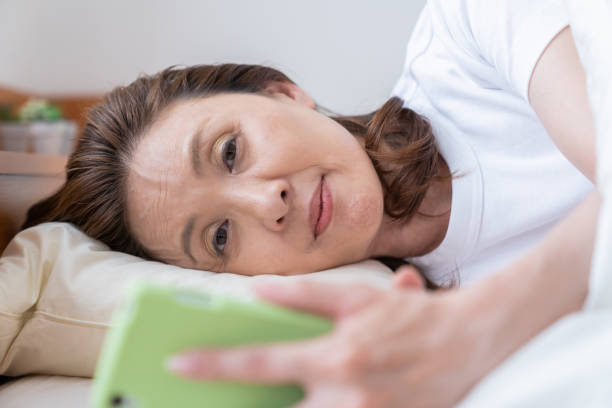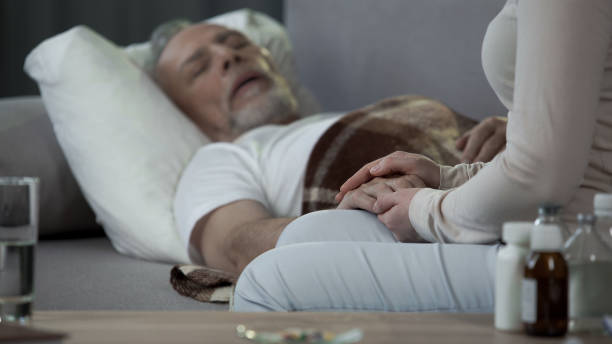Introduction

Living with Parkinson's can be difficult, and insomnia is one of the most debilitating symptoms. Without a good night's sleep, it can be hard to make it through the day without feeling exhausted.
Unfortunately, this lack of restorative rest can often lead to more serious problems like depression and anxiety. But there is hope – if you're struggling with insomnia due to Parkinson's disease, these tips may help you improve your sleep patterns to get the restful slumber your body needs.
Read on for simple strategies that could make all the difference in managing your condition while still getting a good night's rest!
What is Parkinson's disease?

Parkinson's disease is a progressive nervous system disorder affecting movement. It is caused by a loss of dopamine-producing brain cells, which leads to impaired motor control and tremors. Symptoms include slow movement, rigidity, and difficulty with balance or coordination.
What's the relationship between Parkinson's and insomnia

Research has found that people with Parkinson's are more likely to develop insomnia and other sleep disorders, such as restless leg syndrome and REM sleep behavior disorder (RBD).
The underlying motor and non-motor symptoms of the condition usually cause insomnia in Parkinson's disease. For example, medication side effects, depression, and anxiety can lead to insomnia. Other contributing factors may include disrupted circadian rhythms and increased nighttime restlessness.
Fortunately, there are steps you can take to help manage your insomnia if you're living with Parkinson's disease:
1) Talk to your healthcare provider to discuss treatment options, such as medications that target specific symptoms.
2) Establish a regular sleep schedule by going to bed and waking up at the same time each day.
3) Avoid caffeine, alcohol, and other stimulants before bedtime.
4) Participate in regular physical activity throughout the day and avoid vigorous exercise in the evening.
5) Follow a healthy diet and limit large meals before bedtime.
6) Try relaxation techniques, such as meditation or breathing exercises, to help you relax before bed.
7) Break up naps throughout the day instead of sleeping for long periods.
8) Create a comfortable sleep environment that is cool, dark, and quiet.
These tips can help manage your insomnia and get the needed restful sleep. If your insomnia persists, be sure to speak to your healthcare provider, as they can evaluate potential underlying causes and provide additional treatment options. With the right strategies, you can look forward to a healthier, more restful night's sleep!
How are sleep problems treated in people with Parkinson's disease?
Sleep problems in Parkinson's disease can be managed with lifestyle changes and medications. It is important to note that some medications used for other symptoms of Parkinson's may worsen sleep problems, daytime sleepiness, so talk to your doctor about any potential side effects of your current medications.
Lifestyle modifications are an important part of managing insomnia in Parkinson's disease. Here are a few tips for reducing sleep disturbances and improving sleep quality:
-
Avoid caffeine, nicotine, and alcohol before bed.
-
Exercise regularly during the day to increase your energy level and help you get a good night's rest.
-
Establish a regular bedtime routine. This can help relax your body and mind before sleep.
-
Avoid napping during the day, as this can make it harder to fall asleep at night.
-
Try relaxation techniques such as deep breathing, meditation, or progressive muscle relaxation before bed.
-
Avoid screens and other distractions (e.g., phones, TVs, etc.) before bedtime.
-
Make sure your bedroom is comfortable, dark and quiet. Friction-reducing sheets and sleepwear can improve mobility, comfort and sleep quality.
-
If possible, expose yourself to natural light during the day to help regulate your body's sleep-wake cycle.
-
Talk to your doctor about medications that are interfering with your sleep. Your doctor may also suggest a mild sleeping pill to help you fall asleep.
By making these lifestyle changes and talking to your doctor, you can find the best way to manage your sleep disturbances and get a good night's rest.
10 tips to help for managing insomnia in Parkinson's disease
1. Don't have caffeine before you go to bed
Caffeine is a stimulant and can make it difficult to fall asleep. Avoid or limit caffeine-containing foods, drinks, and medications near bedtime.
2. Create a relaxing sleep environment
The environment you sleep in can be important in getting a good night's rest. Ensure the room is dark and quiet and the temperatures are comfortable for sleeping.
3. Exercise regularly
Regular exercise has been shown to have continuous positive airway pressure effects on sleep. It can help you fall asleep faster and increase time in a deep sleep.
4. Don't stare at a clock
Watching the time pass can make it harder to fall asleep, as it can make you anxious about not getting enough rest. Put your clock away or turn it around so you can't see it.
5. Don't nap during the day
For some people, napping during the day can make it harder to fall asleep at night. If you are having trouble sleeping and feel like you need a nap, try to limit it to less than an hour in the late afternoon or early evening.
6. Avoid eating late at night
Eating late at night can interfere with sleep by disrupting your blood sugar levels and causing indigestion. Try to avoid eating heavy meals within a few hours before bed.
7. Follow a regular schedule
A consistent sleeping pattern benefits people with insomnia, so aim to go to bed and wake up simultaneously every day.
8. Take a hot bath or shower
A warm bath or shower before bed can help relax your body, making it easy to drift off to sleep.
9. Try relaxation techniques
Relaxation techniques like deep breathing, progressive muscle relaxation, and guided imagery can help you relax and prepare for sleep.
10. Talk to your doctor
If you continue having trouble sleeping despite the above tips, talk to your doctor about other strategies that might help. They may recommend medications or psychological treatments like cognitive-behavioral therapy (CBT).
There are many ways to manage insomnia in Parkinson's disease. Talking to your doctor about strategies for getting a good night's sleep is important. You can get back on track with your sleeping habits with the right treatment.
What other types of sleep disorders do people with Parkinson's disease have?
The most common type of sleep disorder in people with Parkinson's is insomnia, characterized by difficulty falling asleep, staying asleep, and waking up too early. Other types of sleep disorders that have been associated with PD include rapid eye movement (REM) behavior disorder (RBD), daytime sleeping or excessive daytime sleeping (EDS), excessive daytime sleepiness, and restless legs syndrome (RLS).
People with PD can take various steps to manage their insomnia.
Here are a few tips that may be beneficial:
-
Regular exercise during the day can help improve sleep quality at night. Just make sure not to exercise within two to three hours of bedtime.
-
Establish a regular sleep routine. Create a calming pre-bedtime ritual you follow each night, such as reading or bathing.
-
Avoid caffeine after lunch, and minimize alcohol intake in the evening.
-
Make sure your bedroom is comfortable and conducive to sleep. A cool, dark room is ideal.
-
Avoid napping during the day, as it can disrupt normal nighttime sleep.
-
Talk to your doctor about possible medications to help you sleep better. Medications such as melatonin or benzodiazepines may help improve insomnia in people with PD.
-
Speak to a sleep specialist if your insomnia persists or is particularly severe. A sleep specialist can help you identify underlying causes and develop an effective treatment plan.
What else can I do to sleep better with Parkinson's disease?
If you have Parkinson's disease and are struggling to get a good night's rest, here are some tips that may help:
1. Stick to a regular sleep schedule. Going to bed and waking up around the same time every day will help your body adjust to a rhythm and make it easy to fall asleep.
2. Reduce your caffeine consumption. Caffeine can make it hard for you to relax and sleep, so try to limit your intake of coffee, tea, and soda throughout the day.
3. Exercise regularly and stay active during the day. Exercise can help improve your sleep quality by increasing serotonin levels in your brain and helping you relax.
4. Avoid screen time before bed. The blue light from cellphones, laptops, and TVs can prevent melatonin production in your body which is essential for a good night's sleep.
5. Try relaxation techniques such as yoga or meditation before bedtime. These activities can help you focus your mind and body on calming down, allowing you to drift off into a peaceful sleep.
6. Talk to your doctor about medications that could help with sleeping. If natural remedies for insomnia don't seem to be working, there are medications available that may provide some relief from your symptoms.
7. Use mobility-enhancing garments and sheets to help improve comfort, independence and sleep.
Following these tips may help you get a better night's sleep, but remember to always talk to your doctor if you are having trouble sleeping or if any changes occur in your condition.
FAQs
What are three strategies to help with insomnia?
1. Develop a regular sleep schedule – try to go to bed and wake each day simultaneously, even on weekends.
2. Avoid stimulants like caffeine and nicotine close to bedtime.
3. Exercise regularly but not too close to bedtime; morning exercise is often best for promoting better sleep at night.
What should I do if my insomnia is caused by anxiety?
1. Develop a calming pre-bedtime routine that you can practice regularly.
2. Work on identifying and managing the sources of your anxiety during the day.
3. Practice relaxation techniques such as progressive muscle relaxation, mindfulness meditation, and deep brain stimulation.
4. Talk to your doctor about whether medications or other treatment options may help manage your insomnia.
What is the best sleep medication for Parkinson's disease?
The best sleep medication for Parkinson's disease will vary from person to person. Talk to your doctor about the benefits and side effects of the different sleep medications available and how they may interact with any other medications you are taking. It is important to work closely with your doctor when determining which sleep medication is right for you.
How do Parkinson's patients sleep?
The quality of sleep for Parkinson's patients can vary greatly. People with Parkinson's may experience difficulty falling asleep and staying asleep, as well as disrupted deep sleep due to the disease. Symptoms like restlessness and pain can also affect the quality of sleep. Working closely with your doctor is important to develop strategies to improve your sleep hygiene and manage symptoms that can cause insomnia.
Why can't people with Parkinson's sleep at night?
People with Parkinson's may experience difficulty falling asleep and staying asleep due to the symptoms of the disease. These can include restlessness, pain, tremors, and other neurological symptoms that disrupt sleep. Additionally, medications for Parkinson's disease sleep scale may increase wakefulness at night or cause other sleep fragmentation.
Does levodopa cause insomnia?
Levodopa, a medication commonly used to treat symptoms of Parkinson's disease, can cause insomnia in some individuals. Other medications for Parkinson's disease, such as dopamine agonists, can also cause insomnia. Talk to your doctor if you are experiencing insomnia while taking levodopa.
Does levodopa cause insomnia?
Levodopa, a medication commonly used to treat symptoms of Parkinson's disease, can cause insomnia in some individuals. Other medications for Parkinson's disease, such as dopamine agonists, can also cause insomnia. Talk to your doctor if you are experiencing insomnia while taking levodopa or other medications. They may be able to adjust your dosage or recommend other treatments for managing your insomnia.
Conclusion
In conclusion, managing insomnia in Parkinson's disease can be an ever-present challenge for patients and their caretakers. Understanding the relationship between Parkinson's and insomnia is essential to commit to good sleep hygiene to combat chronic insomnia.
These ten tips provide actionable strategies that can effectively address short-term shortfalls in sleep disturbance and promote long-term healthy obstructive sleep apnea habits. Finally, it's important to be familiar with other common types of sleep disorders specific to individuals with Parkinson's disease.
If there is any emergency, consult your doctor right away to address proper treatment. With this knowledge, sleeping should no longer feel like a Sisyphean task as better understanding of how to manage our rest can lead to better sleep quality.

